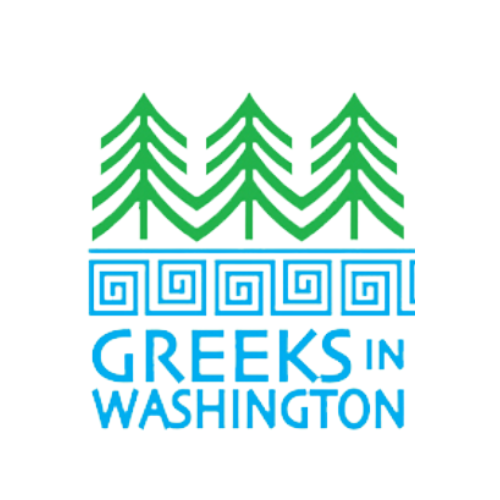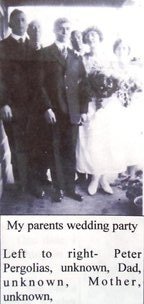AHEPA’s Unsung Hero
Combine a 50-year career in oceanography, over 70 years as a photographer, over 50 years using computers and over 40 years studying his Greek heritage and one begins to appreciate the fruitful life of Eugene (Efthemios) Evans (Evangelos) Collias.
A Life of Study and Information
Eugene Evans Collias with the 1940 AHEPA convention book by John Nicon
Eugene was born in Cumberland, Washington, on February 3, 1925. He spent most of his young life in Centralia, Washington. After high school he attended Centralia Junior College and completed his Master’s degree in chemistry at the University of Washington in Seattle inJanuary 1951. He began his career in oceanography in August 1948 at the University of Washington’s Oceanographic Laboratory. In January 1959 he earned another Master’s degree in oceanography from the Scripps Institution of Oceanography at the University of California at San Diego.
Back in Seattle he was appointed senior oceanographer at the University of Washington and in January 1970 was promoted to principal oceanographer, a position he held until his retirement in July 1980. While at the University, he formed his own consulting firm which operated for ten years until “the market dropped out.”
Eugene at his computer by John Nicon
Eugene’s oceanographic data by John Nicon
Most of his work was in Washington’s Puget Sound where he developed a major data base for future study. This data base included over 95% of the chemical and physical studies made in Puget Sound from 1932 to 1975 and is still being used to compare recent data with the historic data. This comparison would show any significant changes in the waters of Puget Sound. Eugene spent two summers in the Arctic Ocean, time in the Aleutian Islands and six weeks tracing the edge of the fresh water plume of the Columbia River as it empties into the Pacific Ocean. Since 1980 he has continued to “dabble” in oceanography.
Photography
Eugene’s first camera
In the seventh grade Eugene paid $25.00 for his first camera, an ARGUS C. It was a fortune for him at that time. He took photos for his high school and junior college yearbooks, developed much of his own black and white film and made his own enlarger. Eugene could be seen with one camera over each shoulder, one with a wide-angle zoom lens and the other with a telephoto zoom lens to save time changing lenses.
Over the years he has made many slide and photo presentations beginning with a travelogue of his first trip to Greece in 1973. For his church bicentennial celebration he and his wife Dorothy made presentations to 22 churches throughout the northwest. There are over 75,000 slides in Eugene’s basement. He is one of two from the Seattle Photographic Society with an associateship in the Photographic Society of America (PSA), which is an acknowledgment for service rendered to PSA and to the local photographic community.
Eugene in barge office, 1980
Eugene began working with computers in January 1959 and was one of the first to take a computer to sea. The computer functioned very well but the operator sometimes was found leaning over the railing. Computers became very important in his work for storing and analyzing data. The data from his oceanographic work that originally used over 250,000 IBM cards now fills less than one compact disc. He has applied his computer skills extensively in his volunteer work. Today Eugene’s computer has four hard drives and two large monitors where the image or document found on the first monitor automatically enlarges and appears on the second.
Eugene at his computer.
A Greek Historian
Eugene Collias is an historian. He is able to trace his family name back to 1752 and his late wife Dorothy’s name to 1245. He has compiled a four-volume history of his and Dorothy’s life and work. The details of dates, times and experiences attest to Eugene’s amazing attention to detail. His interest in history, along with his father’s Greek heritage, led to his involvement with AHEPA (American Hellenic Educational and Progressive Association).
Atlanta 1982 AHEPA convention name tag by John Nicon
Greek was not Eugene’s first language, nor was it spoken in his home. Thus, when he needed to communicate with his Greek AHEPA brothers, he simply asked them to speak English and they did. His organizational, leadership and computer skills were quickly put to use. In Seattle he served as chapter secretary and treasurer, then treasurer for the District Lodge and as an advisor. He chaired two district conventions and recalls attending the 60-year-anniversary national conference in Atlanta, Georgia. For the past 20 years Eugene has maintained the membership list and mailed the AHEPA district newsletter, The AHEPA Mentor, every other month.
Eugene and Dorothy
Eugene and Dorothy wedding, 1949
Eugene’s late wife Dorothy was even more active serving as president of the Alcides chapter and district secretary of the Daughters of Penelope, AHEPA’s sister organization, and advisor to the Maids of Athena, the junior order of the Daughters of Penelope. An artist and music teacher, she worked with Eugene in their organizational and photographic work. During 1977 she conducted and transcribed a number of oral interviews for a Greek heritage project.
Eugene and Dorothy had two daughters, Rebecca and Rachel. Rachel’s children, Zechariah and Clarisse, now live with their grandfather in Seattle. Rebecca is a massage therapist and Rachel is an Associate Professor of Family Medicine in West Virginia.
Greek Family Story
Evans and Lucy Mae Collias at their wedding, 1924
Eugene’s father Evangelos (Evans) Collias was born in Kaloskopi (formerly Koukouvista), Greece, in 1898. He came to the United States in 1912 and worked with his older brother Constantinos in Portland, Oregon, for the railroad. After serving in the U.S. Army in World War I he “automatically” became a naturalized citizen and began working in the coal mines in Washington. Eugene’s mother Lucy Mae Sherwood was a cook in the mine.
After their marriage in 1924 they eventually settled in Centralia, Washington, where Evans owned two coal mines. They had three children, Eugene, Thalia and Jim. The mines did well even through the depression but when an arson fire occurred in 1943 and oil was increasingly plentiful the family split for a few years. Evans moved to Seattle and Lucy to Meskill, Washington. In Seattle Evans was in the restaurant, apartment and hotel business. They reunited after a six-year separation. After Lucy Mae died in 1963, Evans was married to Angeliki Koupas for 14 years.
Thalia, Jim and Eugene, circa 1936
When asked if there were any problems being Greek, Eugene responded, “None.” Overall, his experiences have been quite positive and he vividly recalls the tradition of roasting lambs during the family’s coal mining years. When asked how he would like to be remembered, Eugene believes his Puget Sound research and the fact that his data is still being used is his proudest achievement. Then he glanced at his four-volume history and said, “It’s all there.”
By John and Joann Nicon, September 2011.
Sources
Video interview by John and Joann Nicon, September 2011. Photos from the Collias family collection unless otherwise specified.










